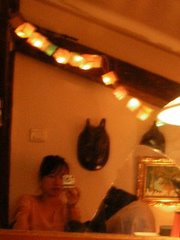
(Painting by Pan Yu Liang)
Before arriving to Taiwan, I didn’t know I was “so Chinese”. As I have already said, I’m a banana (in between, I’ve discovered that the opposite – white outside and yellow inside – is called an “egg”). As I look Chinese, it seems normal that Taiwanese people at first glance, consider me as being a Taiwanese too. When I just arrived to Taiwan, I didn’t have the reaction yet to say that I am a “Huaqiao” or “Huayi” - that is to say “overseas Chinese” or “FBC” (French born Chinese) - I would simply reply that I was French when people would ask me with a suspicious look : “ You’re not Taiwanese, are you?” (I’m quite proud to say that I hear that sentence not that often now, must be a proof that my oral Chinese has improved a lot…) I even experienced some funny looks when I was saying with confidence that I am French like “I had no idea French and Asian people look alike so much…” Once, in a supermarket, I almost had an argument with the cashier. She would keep asking me “are you sure you are French? You must be Chinese, why do you speak Chinese with a funny accent?” and I had to moderate my answer explaining that my mother is Taiwanese but I was born in France etc… At the end she just said, “Well, you are still Chinese, that’s all!”
Is being Chinese a fatality? Or is a fatality being Chinese?
As soon as I arrived in Taiwan, I started having some identity troubles. Strangely, I almost never felt these itches while I was in France. Especially in Paris where people are so mixed. Maybe some would think I am a tourist, but everybody can potentially be a tourist over there, it mainly depends on the way you are dressed, your way of being, more than your physical appearance. It never came to my mind to say I am a French Born Chinese. Of course people would eventually ask me where my parents are from, if I was born in France. But my saying I’m French had never been something strange or rare.
Here, in Taiwan, I’m actually experiencing a strange transformation: the “banana-becomes-an-egg” mutation. First, I gradually changed my answer, now I always mention the fact that my mother is Taiwanese, etc. “Nice to meet you, I’m Cerise. Don’t be surprised, I’m a French born Chinese, my mother is Taiwanese but I was born in France and I have lived there almost all my life.” That became my name card. By means of repeating I’m Chinese, I really started to believe it (the “kouei method”, by auto-suggestion seems to work after all!)
Is this what immigration and integration are about? Before coming to Taiwan, I didn’t know whether I would acclimatize myself so much. Some of my Taiwanese friends say it is normal, it must be in my genes. Then I, my mother and my brother must also have French genes because we are pretty well integrated in the French Nation. For what I know, I am a “pure Han product”, I was born with two blue spots on the bottom (don’t worry, they disappear when the baby grows up) and I have a visible line on my forearm which are said to be the genetic marks of Han people. Both of my parents are Hakkas, a Chinese linguistic group and, when I was a child, my father used to say proudly that my brother and I were 100% Hakkas… with a “little something French”, would he add in order to tickle. Then, from the genetic angle, I cannot claim to be the result of mixes like American people for example (About that subject, read this very amusing text by Bob: My Chance Encounters with Chance.) But on the cultural front, I am the result of my parents’ past migration to France : a French girl with a little something of Chinese… Guess what!...
Today’s favourites
My Chance Encounters with Chance by Bob
International Migrations Today by Kailing Wang








